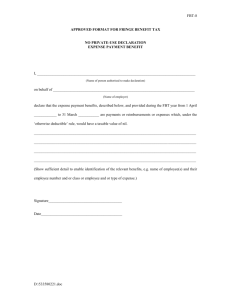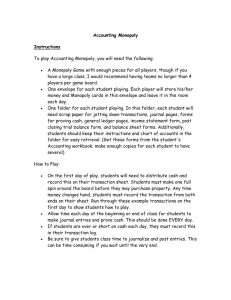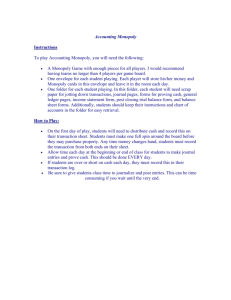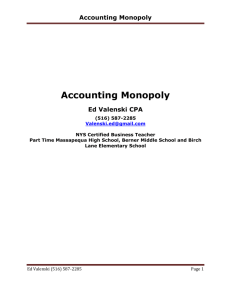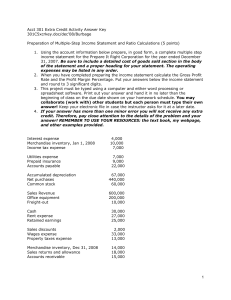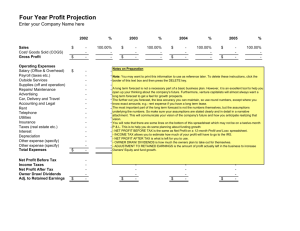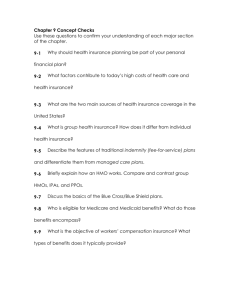accounting monopoly
advertisement
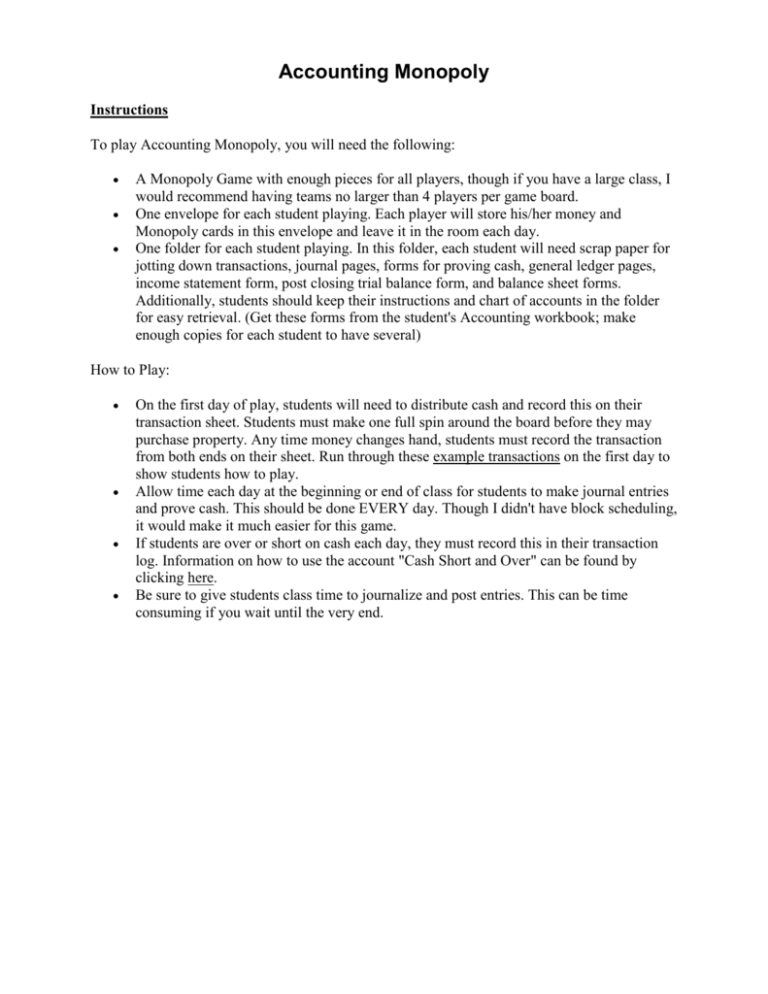
Accounting Monopoly Instructions To play Accounting Monopoly, you will need the following: A Monopoly Game with enough pieces for all players, though if you have a large class, I would recommend having teams no larger than 4 players per game board. One envelope for each student playing. Each player will store his/her money and Monopoly cards in this envelope and leave it in the room each day. One folder for each student playing. In this folder, each student will need scrap paper for jotting down transactions, journal pages, forms for proving cash, general ledger pages, income statement form, post closing trial balance form, and balance sheet forms. Additionally, students should keep their instructions and chart of accounts in the folder for easy retrieval. (Get these forms from the student's Accounting workbook; make enough copies for each student to have several) How to Play: On the first day of play, students will need to distribute cash and record this on their transaction sheet. Students must make one full spin around the board before they may purchase property. Any time money changes hand, students must record the transaction from both ends on their sheet. Run through these example transactions on the first day to show students how to play. Allow time each day at the beginning or end of class for students to make journal entries and prove cash. This should be done EVERY day. Though I didn't have block scheduling, it would make it much easier for this game. If students are over or short on cash each day, they must record this in their transaction log. Information on how to use the account "Cash Short and Over" can be found by clicking here. Be sure to give students class time to journalize and post entries. This can be time consuming if you wait until the very end. Accounting Monopoly Example Transactions Transaction Account Classification Description Debit Credit Purchased house for property on Park Place, $125. Asset Houses 125 Asset 125 Cash Purchased Park Place property, $400. Asset Property 400 Asset 400 Cash Rec'd cash for rent from Illinois Avenue, $50. Asset Cash 50 Revenue 50 Rent Income Paid cash to Cory for rent (R&R Railroad), $100. Expense Rent Expense 100 Asset 100 Cash Received cash bonus for good work, $300. Asset Cash 300 Revenue 300 Other Income Received loan from the bank, $1000. Asset Cash 1000 Liability 1000 Monopoly Bank & Realty Paid $150 for income tax. Expense Tax Expense Asset Cash 150 150 Chart of Accounts Assets Cash Property Houses Hotels Monopoly Bank and Realty ____________, Capital Income Summary Acct # 110 120 130 140 210 310 540 Revenue Rent Income Other Income Expenses Interest Expense Misc. Expense Rent Expense Tax Expense Utility Expense Cash Short and Over Acct # 410 420 510 520 530 410 550 560 Remember to review all expense accounts before classifying an expense as a Miscellaneous Expense. There are only two kinds of income: Rent Income and Other Income. When you MAKE money, it will affect one of these accounts. ACCOUNTING MONOPOLY Chart of Accounts Assets Acct # Revenue Acct # Cash 110 Rent Income 410 Property 120 Other Income 420 Houses 130 Expenses Hotels 140 Interest Expense 510 Monopoly Bank and Realty 210 Misc. Expense 520 ____________, Capital 310 Rent Expense 530 Income Summary 540 Tax Expense 410 Utility Expense 550 Cash Short and Over 560 Update select accounts in the general ledger for the above chart of accounts on the computer. Each group should appoint a banker. o The banker issues $1500 in cash to each player. Each player should count his money to make sure he receives the correct amount. o Each player should then prepare an opening entry on the computer. You are now ready to start the game. Be sure to follow the rules of the game. Each group should set their own rules on building houses, selling property, etc. Each roll of the dice may result in either no journal entry, one player making an entry, or in two players making an entry. Be careful not to play too fast as there are usually business transactions to record after each throw of the dice. SUGGESTION: When journalizing--If you are using two special columns, it may be wise to make a notation about the entry under the account title column. Example: When using Property Debit and Cash Credit--you may want to put the name of the property you purchased in the account title column. When you pay taxes, you may want to tell what kind of taxes you are paying, etc. Give details about any journal entry that you feel will benefit you later when preparing financial statements. At the end of each day, cash is proved to see if the books coincide with the actual cash count. If it does not, make an entry in the journal through the cash short and over account. o Each student should record on a sheet where they were on the board at the end of the day, the number of houses or hotels owned on each piece of property, list of property owned, and a list of property that may be mortgaged. o Place the papers used in your envelope and folder. Return the game pieces to the box The last day, you will close your books to see how well you have done (profit or loss). You need to: o Print all journals o Prove cash o Prepare a worksheet o Prepare an income statement o Prepare a balance sheet o Record closing entries o Post closing entries o Prepare a post-closing trial balance Name:__________________________ Transactions Transaction Account Classification Accounts Debit Credit
